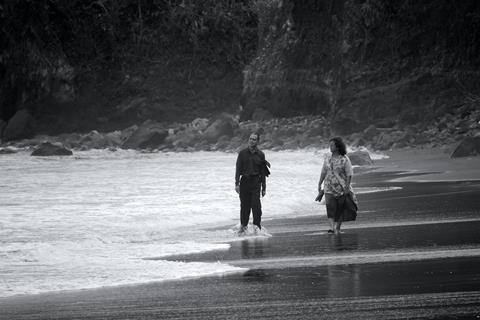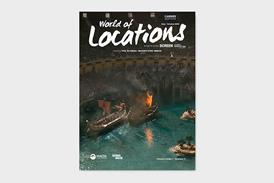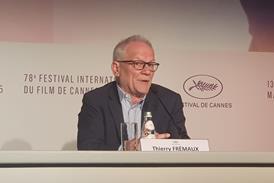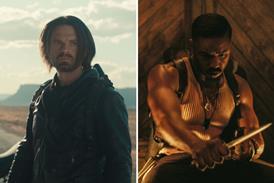Filipino director Lav Diaz takes direct aim at the Duterte regime with this tale of crime and corruption

Dir/scr: Lav Diaz. Philippines/France/Portugal/Denmark. 2022. 187mins
Filipino director Lav Diaz has not just developed his own style of cinema, it’s true to say that he has invented his own form of cinematic time. Some Diaz films are relatively brief – 228 minutes in the case of 2016 Venice Golden Lion winner The Woman Who Left – while others stretch to testing lengths, notably 2004’s Evolution of a Filipino Family, which scrapes nearly 11 hours. But Diaz’s films find their own necessary durations, and even his shorter ones are contemplative and expansive in a way that makes for a singularly hypnotic form of viewer immersion. At just over three hours, When the Waves Are Gone benefits from international co-production funding, yet is typically spare for a Diaz film and focuses tightly on its central drama – a psychological/existential duel between two counterparts. Those who have found the time to be Diaz completists – and there are more of them around than you’d think – will lap it up, but the film’s tautness and directness could open up new distribution avenues following its out-of-competition Venice debut.
This is one of Diaz’s stories most specifically set in the present, and most overtly decrying the Duterte regime
Like Diaz’s 2013 Norte: The End of History, the film follows two characters in parallel. One is a cop gone to the dark side, the other a bad ‘un who has found God (but in a very dark way). Manila police lieutenant Hermes Papauran (John Lloyd Cruz, a Filipino mainstream star but also a Diaz regular) is first seen lecturing a class of cadets, with a quotation on the wall from Agatha Christie’s Hercule Poirot: “One must seek the truth from within, not without.”
What follows isn’t a detective story, but it’s definitely a search for inner truth. Although a revered star detective, Hermes quickly emerges as a violent man; both towards his wife and a fellow cop who’s denounced him. Taking a break from police work, he has a heart to heart with his friend, crime photographer Raffy (Dms Boongaling), committed to exposing the institutional horrors committed by the Filipino government – notably the summary execution of people alleged to be drug traffickers. Raffy has been accused by the explicitly named Duterte regime of fabricating ‘fake news’, which will put international audiences in mind of certain other recent populist demagogues.
In an extended scene, Hermes and Raffy have one of those philosophical discussions that are a Diaz staple: in this case, about the state of transcendental extremity, hysteria or possession that seizes warriors and, indeed, police officers. It also affects criminals, as we see when the narrative shifts to Primo Macabantay (Ronnie Lazaro), released from jail after 10 years with obscure government patronage on his side and now a religious fanatic. While he waits to get even with Hermes, he has a habit of giving surprise baptisms to people he meets – which, in one macabre sequence of black comedy, lands him with a corpse in his hotel room, leading him to try and buy embalming fluid at a neighbourhood shop.
Hermes – afflicted by heavy psoriasis, seemingly a traumatic effect of the violence he’s witnessed and been involved with – visits his country-dwelling older sister Nerissa (Shamaine Centenera-Buencamino). She resents him abandoning their family, but takes him in and shows him their old beach dwelling, now being devoured by sand and sea; much as, it’s suggested, Filipino society is being eroded by political rottenness. Eventually, there must be a showdown between Hermes and Primo, whose equivalence as peers in moral degradation is connoted by both men’s performance of a deranged solo shimmy – which, in a final stretch steeped in nocturnal noir atmospherics, emerges as a dance of death.
Himself editing and designing, Diaz again works with DoP Larry Manda, whose black and white photography often features tightly composed interiors that box the characters into a restrictive frame, almost like figures in Francis Bacon paintings. Visually and narratively less expansive than some other Diaz films, this is one of his stories most specifically set in the present, and most overtly decrying the Duterte regime – as opposed to, say, 2019’s The Halt, which alluded to it via a satirical future dystopia. Although the final hour slackens somewhat as it moves towards the eventual showdown, overall the film capitalises on the spareness to deliver a payoff that feels downright mythic in its primal charge – like Dostoevsky, Jacobean tragedy and High Noon, in one brutal cocktail.
Production companies: Sine Olivia Pilipinas, Epicmedia, Films Boutique, Rosa Filmes
International sales: Films Boutique contact@filmsboutique.com
Producers: Bianca Balbuena, Bradley Liew, Jean-Christophe Simon, Joaquim Sapinho, Marta Alves
Cinematography: Larry Manda
Production design: Lav Diaz
Editing: Lav Diaz
Main cast: John Lloyd Cruz, Ronnie Lazaro, Shamaine Centenera-Buencamino, Dms Boongaling






















![The Brightest SunScreen[Courtesy HKIFF]](https://d1nslcd7m2225b.cloudfront.net/Pictures/100x67/3/5/0/1448350_thebrightestsunscreencourtesyhkiff_312678.jpg)









